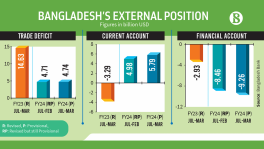Meagre farmer’s income pushing people towards non-agri sectors
PPRC Executive Chairman Hossain Zillur Rahman said now was the time for further research on the emerging rural middle class, rural dynamics, political and economic power and farmer's sociological identity

A family has never been able to survive on a farmer's income alone, which is why people in the rural areas are turning towards other non-agricultural sectors, speakers said.
Speaking at an event hosted by the Power and Participation Research Center on Saturday, MA Sattar Mandal, agricultural economist and professor of the agricultural department at the Bangladesh Agricultural University, said, "The rate of migration from rural areas has also decreased as job opportunities have been created. Many families in the village are now emerging as middle class families, but they are still not able to ensure education for their children."
He said while they had increased the spending behind health and nutrition, education had taken a backseat as its quality had not improved in rural areas.
PPRC Executive Chairman Hossain Zillur Rahman said now was the time for further research on the emerging rural middle class, rural dynamics, political and economic power and farmer's sociological identity.
He said research was the only way to identify the untapped potential of the rural economy.
Ahsan Khan Chowdhury, chairman and chief executive officer of the Pran-RFL Group, said, "Once, 80% of our products were sold in Dhaka and Chattogram, and 20% in rural areas. Now, 20% is being sold in Dhaka-Chattogram and 80% in rural areas. The main reason for this is that new places of work have been created in the countryside, those who are working outside are sending money and people are able to spend on leisure.
"A big part of our agriculture was to provide food for the people of the country. But now many are working to create a supply of raw materials for industries. In the next 6-7 years, agriculture will become a big growth driver because the relationship between industry and agriculture will be narrowed."
During her speech, Sanjida Akhtar, associate professor, women and gender studies, Dhaka University, said more women were involved in the agriculture sector due to male migration. But, they still had to suffer from land and credit crises as they were not yet recognised as farmers.
Speakers also identified abnormal house rent, energy crisis and quality of education as big challenges that needed to be overcome.


 Keep updated, follow The Business Standard's Google news channel
Keep updated, follow The Business Standard's Google news channel
















